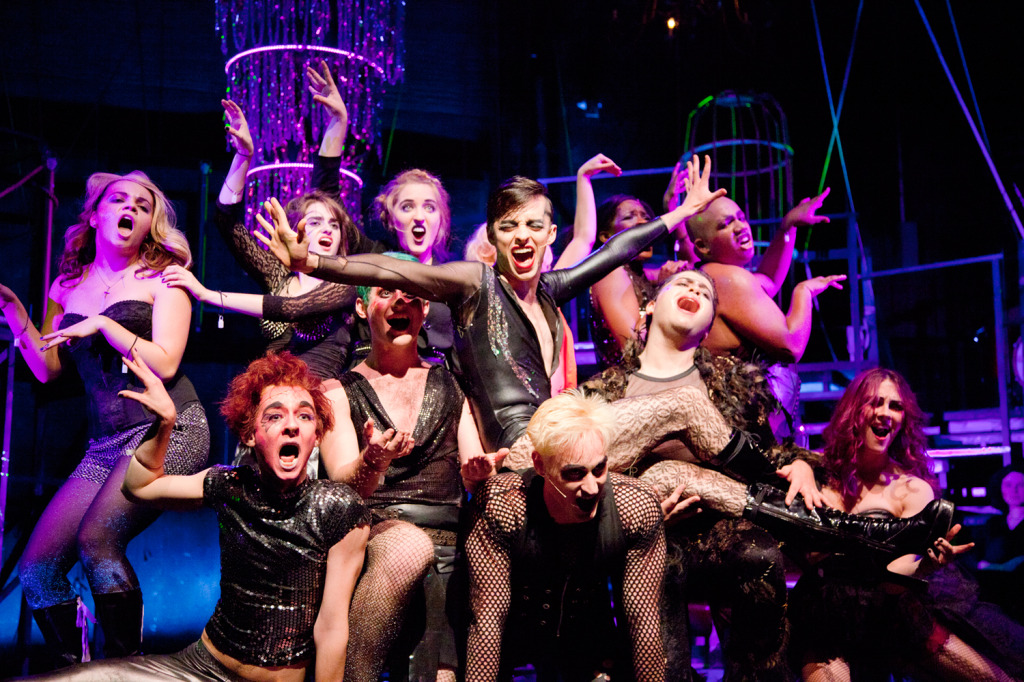
A pre-pandemic performance of the Rocky Horror Picture Show. Courtesy of Elizabeth Miles
Determined that the “Rocky Horror Picture Show” must go on at Yale despite the pandemic, the show’s student devotees hosted a virtual showing of the performance.
The show — spearheaded by Aurora Grutman ’22 for the second year in a row — drew 172 attendees, twice as many as last year. Those behind the production livestreamed the show via a platform called CYA Live, which is promoted by The Criterion Collection — the owner of the film’s rights. The original movie appeared with the eight-person shadow cast appearing in small boxes at the bottom of the virtual screen.
“I think the performance went as well as could be expected and incredibly well if you ignore the lag between the movie and the performers,” said Reilly Johnson ’22, who acted in the show. “I was really proud to do something new and unique, and I thought it was cool that we were sticking with something we all love so much even in the terrible circumstances of the pandemic.”
Prior to the show, the production team and actors struggled to find a form of virtual presentation that would allow them to include the jeering, dancing and liveliness and the callbacks — responses shouted out by audience members in sync or in response to the original film, often disparaging the film in obscene language — present in typical showings of “Rocky Horror.”
Even though the team was unable to accurately recreate this experience, the online format made the show more inviting for many first-time viewers, as it allowed them to watch from a more familiar setting, according to first-time attendee Max Krupnick ’23. The show’s raucous callbacks were transformed into silent chatbox entries.
Grutman mentioned that the day before the show, the cast realized that the CYA Live chat function disabled the use of profane language.
“People couldn’t write ‘balls,’ or ‘fuck,’ or even ‘phuc,’” said Grutman. “A lot of the callbacks are pretty explicit.”
Luckily, the cast managed to remove this restriction. During the show, even though a vast majority of the audience did not know the callbacks, a single attendee knew them all.
“People who’d never seen the show realized this [audience member] was saying integral parts of the audience participation in the chat and would chime in,” Grutman said.
What resulted was a unique display of audience participation. Not only were the callbacks typed out in a chat rather than shouted out, but they also deviated greatly form their usual script. Participants specifically seized upon a classic callback, “Where’s your neck?,” typically yelled when the narrator makes their first appearance, chatting the question every time the narrator appeared on screen.
“Having never seen the show, I didn’t fully understand the culture of callbacks,” Krupnick said. “But [I] did enjoy goofing around in the chat.”
Some attendees felt that the online showing actually made it easier to participate in a cultural phenomenon which can be difficult to partake in in person.
“The idea of dressing up and attending an interactive show is prohibitively intimidating for many people,” Krupnick said. “The fact that I could watch the show in my common room with just my friends made it an easy sell.”
But Grutman said that people are also naturally shyer on camera. Since audience members were more reluctant to participate, Grutman and her co-actor Charlie Foster ’21 became the sole actors in the orgasm-faking competition intended for the first timers.
The team was aware that many traditional components of “Rocky Horror,” such as the orgasm-faking competition, might make attendees uncomfortable. To make attendees feel more at ease, the production team chose not to record the show and prohibited audience members from filming it.
Johnson said the “Rocky Horror” team was “really intentional about … [their] treatment of the difficult elements of ‘Rocky,’ specifically the sexual assault and cannibalism,” adding that they had many internal discussions about those topics. During the performance, actors notified the audience in advance and connected them to resources discussing uncritical portrayal of sexual violence in “Rocky Horror.”
Grutman said that despite the great limitations of showing Rocky Horror virtually, she loves the show. The online format even allowed the show to transform in new ways, she said.
“What I love about ‘Rocky’ is that it’s a space where you can really create,” said Grutman. “And it’s a space for everyone.”
The “Rocky Horror Picture Show” debuted in 1975.
Annie Radillo | annie.radillo@yale.edu







